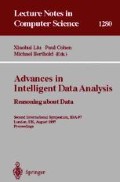Abstract
If we are to implement Intelligent Data Analysis into computer systems we must instantiate the essential aspects of scientific method. In the quest to systematically unearth hidden information and bring forth knowledge from complex, noisy and incomplete data, we must be sure that such systems are first able to determine all possible patterns, which are suggestive of such information and knowledge from all possibly relevant, clean and complete data sets.
It will be shown that John Stuart Mill's methods as extrapolated in his ‘System of Logic’ provide such a set of algorithms. The value of all possible relevant data sets is determined prior to the coverage of each of Mill's methods. It is then shown that they are distinct from each other and given any particular data set, only one of the ‘methods’ is applicable, that is that they are disjunct. It is then shown that the methods cover all relevant data sets.
Attention is then directed to some Intelligent Data Analysis systems to determine which of Mill's methods they implement. None of them implement all of them or are aware of the applicability of the methods to the complex task of Intelligent Data Analysis.
Access this chapter
Tax calculation will be finalised at checkout
Purchases are for personal use only
Preview
Unable to display preview. Download preview PDF.
Bibliography
Bacon, F., (1620/1960) The New Organon, [Edited by Anderson, F.H.], 1960 The Bobbs Merrill Co. Inc., Indianapolis, New York.
Blum, R.L., (1982) Discovery and Representation of Causal Relationships from a Large Time-Oriented Clinical Database: The RX Project, Ph.D. Thesis, Department of Computer Science, Stanford University, January 1982, Report No. STAN-CS-82-900.
Blum, R.L., & Wiederhold, G., (1978) Inferring knowledge from clinical data banks utilizing techniques from artificial intelligence, In the proceedings of the 2nd Annual Symposium on Computer Applications in Medical Care, Washington, D.C., IEEE, November, pp. 303–307.
Buchanan, B.G., & Feigenbaum, E.A. (1969) Heuristic DENDRALL A Program for Generating Explanatory Hypotheses in Organic Chemistry, in Meltzer & Michie, (1969).
Cornish, T.A.O., (1995) It's not always bunk, honest!, New Scientist, Forum, Dec, 9.
Cornish, T.A.O., (1996) Historical Perspectives on Information Science, International Journal of Systems Research and Information Science, Vol. 7, No. 2, pp. 105–116.
Hájek, P., Havel, I., & Chytil, M., (1966) The GUHA Method of Automatic Hypotheses Determination, Computing, Vol. 1, pp. 293–308.
Hunt, E.B., Marin, J., & Stone, P.T., (1966) Experiments in Induction, Academic Press, New York.
Langley, P., (1981) Data-Driven Discovery of Physical Laws, Cognitive Science, Vol. 5, pp. 31–54.
Langley, P., Zytkow, J.M., Simon, H.A., & Bradshaw, G.L. (1986), The Search for Regularity: Four Aspects of Scientific Discovery, in Michalski et al. (1986).
Langley, P., Simon, H.A., Bradshaw, G.L. & Zytkow, J.M., (1987) Scientific Discovery: Computational explorations of the creative process, MIT Press, Cambridge MA.
Mill, J.S., (1843/1973) Collected Works, Volume VII, A System of Logic, Ratiocinative and Inductive: Being a Connected View of the Principles of Evidence and the Methods of Scientific Investigation, Books I–III (Ed. Robson, J.M.) University of Toronto Press, RKP.
Meltzer, B., & Michie, D., (1969) Machine Intelligence 4, Edinburgh University Press.'
Michalski, R.S.; Carbonell, J.G.; & Mitchell, T.M., (1986) Machine Learning: An Artificial Intelligence Approach, Volume II, Morgan Kaufman, Los Altos.
Quinlan, J.R., (1986) Induction of Decision Trees, Machine Learning, Vol. 1, No. 1, pp. 81–106.
Shapiro, A. D., (1987) Structured Induction in Expert Systems, Addison Wesley, Wokingham.
Author information
Authors and Affiliations
Editor information
Rights and permissions
Copyright information
© 1997 Springer-Verlag
About this paper
Cite this paper
Cornish, T.A.O. (1997). Mill's methods for complete Intelligent Data Analysis. In: Liu, X., Cohen, P., Berthold, M. (eds) Advances in Intelligent Data Analysis Reasoning about Data. IDA 1997. Lecture Notes in Computer Science, vol 1280. Springer, Berlin, Heidelberg. https://doi.org/10.1007/BFb0052830
Download citation
DOI: https://doi.org/10.1007/BFb0052830
Published:
Publisher Name: Springer, Berlin, Heidelberg
Print ISBN: 978-3-540-63346-4
Online ISBN: 978-3-540-69520-2
eBook Packages: Springer Book Archive

